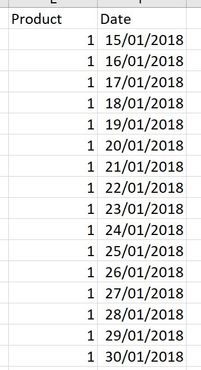- Power BI forums
- Updates
- News & Announcements
- Get Help with Power BI
- Desktop
- Service
- Report Server
- Power Query
- Mobile Apps
- Developer
- DAX Commands and Tips
- Custom Visuals Development Discussion
- Health and Life Sciences
- Power BI Spanish forums
- Translated Spanish Desktop
- Power Platform Integration - Better Together!
- Power Platform Integrations (Read-only)
- Power Platform and Dynamics 365 Integrations (Read-only)
- Training and Consulting
- Instructor Led Training
- Dashboard in a Day for Women, by Women
- Galleries
- Community Connections & How-To Videos
- COVID-19 Data Stories Gallery
- Themes Gallery
- Data Stories Gallery
- R Script Showcase
- Webinars and Video Gallery
- Quick Measures Gallery
- 2021 MSBizAppsSummit Gallery
- 2020 MSBizAppsSummit Gallery
- 2019 MSBizAppsSummit Gallery
- Events
- Ideas
- Custom Visuals Ideas
- Issues
- Issues
- Events
- Upcoming Events
- Community Blog
- Power BI Community Blog
- Custom Visuals Community Blog
- Community Support
- Community Accounts & Registration
- Using the Community
- Community Feedback
Register now to learn Fabric in free live sessions led by the best Microsoft experts. From Apr 16 to May 9, in English and Spanish.
- Power BI forums
- Forums
- Get Help with Power BI
- Desktop
- Using 2 dates (Start & End) to get one continue co...
- Subscribe to RSS Feed
- Mark Topic as New
- Mark Topic as Read
- Float this Topic for Current User
- Bookmark
- Subscribe
- Printer Friendly Page
- Mark as New
- Bookmark
- Subscribe
- Mute
- Subscribe to RSS Feed
- Permalink
- Report Inappropriate Content
Using 2 dates (Start & End) to get one continue colomne date
Hi All,
I'm losing my mind trying to resolve this problem if you can help me please :
I've got a table getting all my product with a start and end date of the promotion :
so, I want to use this table to calculate the number of days which the product was in promotion
I have in my mind to build a new table with a unique date from the start to the end date
any idea how to do this?
If you have another idea, I'll be grateful for your help.
Regards
Solved! Go to Solution.
- Mark as New
- Bookmark
- Subscribe
- Mute
- Subscribe to RSS Feed
- Permalink
- Report Inappropriate Content
HI @nkasdali,
You can simply use below formula to create expand table with detail date range :
Detail Table =
VAR _calendar =
CALENDAR ( MINX ( 'Product', [Start] ), MAXX ( 'Product', [End] ) )
RETURN
SELECTCOLUMNS (
FILTER (
CROSSJOIN ( 'Product', _calendar ),
[Date] >= [Start]
&& [Date] <= [End]
),
"Product", [Product],
"Date", [Date]
)
Regards,
Xiaoxin Sheng
If this post helps, please consider accept as solution to help other members find it more quickly.
- Mark as New
- Bookmark
- Subscribe
- Mute
- Subscribe to RSS Feed
- Permalink
- Report Inappropriate Content
HI @nkasdali,
You can simply use below formula to create expand table with detail date range :
Detail Table =
VAR _calendar =
CALENDAR ( MINX ( 'Product', [Start] ), MAXX ( 'Product', [End] ) )
RETURN
SELECTCOLUMNS (
FILTER (
CROSSJOIN ( 'Product', _calendar ),
[Date] >= [Start]
&& [Date] <= [End]
),
"Product", [Product],
"Date", [Date]
)
Regards,
Xiaoxin Sheng
If this post helps, please consider accept as solution to help other members find it more quickly.
- Mark as New
- Bookmark
- Subscribe
- Mute
- Subscribe to RSS Feed
- Permalink
- Report Inappropriate Content
Hi,
If I understand correctly you want to have the number of days between the start and end date? A method for doing this is using the DATEDIFF function in a Calculated Column.
Number of Days = DATEDIFF(YourTableName[StartDate].[Date],YourTableName[EndDate].[Date],DAY)
Let me know if this works!
Cheers
Alex
- Mark as New
- Bookmark
- Subscribe
- Mute
- Subscribe to RSS Feed
- Permalink
- Report Inappropriate Content
I didn't, but I realized that I can't use my filter date on this case. Exemple : if I select January, I ll have 15 days, February 31 days.
My apologies, I forgot to specify this need.
Regards
Helpful resources

Microsoft Fabric Learn Together
Covering the world! 9:00-10:30 AM Sydney, 4:00-5:30 PM CET (Paris/Berlin), 7:00-8:30 PM Mexico City

Power BI Monthly Update - April 2024
Check out the April 2024 Power BI update to learn about new features.

| User | Count |
|---|---|
| 114 | |
| 100 | |
| 81 | |
| 70 | |
| 62 |
| User | Count |
|---|---|
| 148 | |
| 116 | |
| 104 | |
| 90 | |
| 65 |


